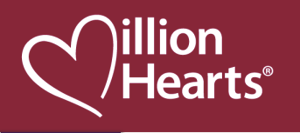Preventing One Million Heart Attacks and Strokes in the U.S.
Almost two million Americans suffer heart attacks and strokes each year. Heart disease and strokes account for about 30% of all deaths in the United States and are the first and fourth leading causes of death, respectively. But the good news is that the major risk  factors for heart disease and stroke—high blood pressure, cholesterol, smoking, and obesity—can be prevented and controlled.
factors for heart disease and stroke—high blood pressure, cholesterol, smoking, and obesity—can be prevented and controlled.
Million Hearts™ is a national initiative to prevent one million heart attacks and strokes in the United States by 2022 by helping Americans make healthy choices, such as quitting smoking and lowering the amount of sodium (salt) and trans fats consumed. Healthy choices mean that fewer people will need to take medicines to control their blood pressure or cholesterol.
Supported by the Centers for Disease Control and Prevention (CDC) and the Centers for Medicare and Medicaid Services (CMS), community health workers (CHWs)/promotores de salud, community health representatives, and others work together to help reach the program’s goal by teaching community members:
- They need to get screened for high blood pressure and cholesterol because most of the time, people at risk do not feel sick and are not aware they have these conditions.
- To ask for and know their blood pressure and cholesterol numbers, and to know what healthy levels should be.
- How important it is for them to control their blood pressure and cholesterol.
- That uncontrolled high blood pressure and cholesterol can damage their eyes, kidneys, heart, blood vessels, and brain. High blood pressure can also lead to chronic kidney failure requiring dialysis.
- That high blood pressure and cholesterol will put them at high risk for heart attack, heart failure, and stroke.
Also, health workers:
- Encourage community members to ask their doctor what their goals should be for blood pressure and cholesterol.
- Help those who have diabetes understand the importance of controlling the disease and regularly taking their diabetes medications.
- Introduce community members to social workers and others who can help them apply for programs and insurance that can help pay for health care.
Reference: https://millionhearts.hhs.gov/




